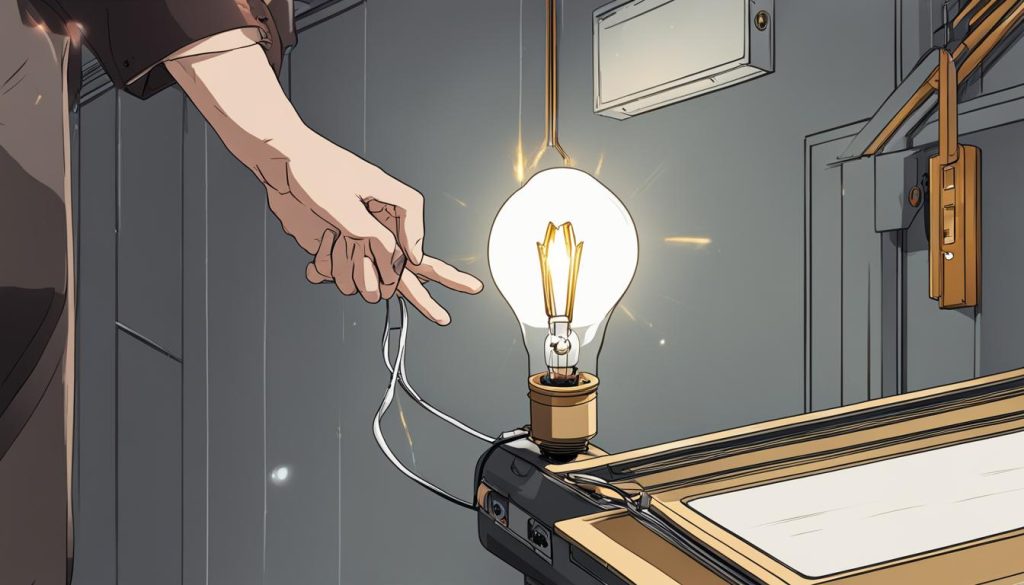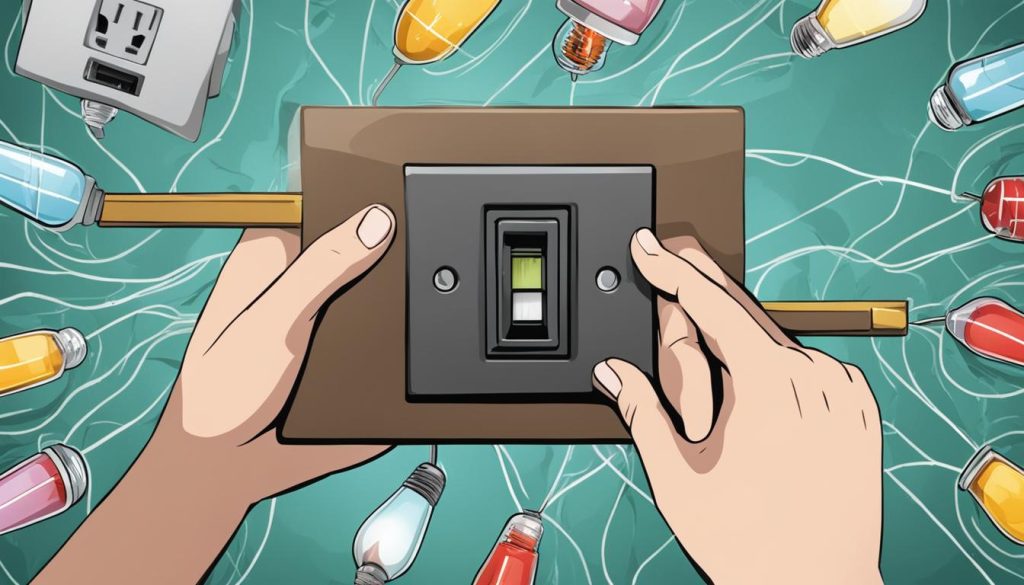Switch Electricity Provider – Save Money & Energy
Are you tired of paying exorbitant electricity bills every month, but feel helpless to do anything about it? Switching your electricity provider is a simple solution that can potentially save you a significant amount of money in the long term. By changing your energy supplier, you can secure a better tariff that suits your needs, and also contribute to a greener environment by choosing a provider that utilizes sustainable energy sources.
Switching your electricity provider is a relatively straightforward process that only requires some research and effort on your part. In this section, we will guide you through the benefits of switching your electricity provider, how to do it effortlessly and how to find the best tariffs for your energy needs.
Key Takeaways:
- Switching electricity providers can potentially save you money on your energy costs.
- By switching to a greener provider, you can also contribute to a more sustainable future.
- Research various providers and tariffs to find the most suitable option for your needs.
- Calculate your energy usage to make an informed decision about the best tariff for you.
- Make the switch seamlessly by following the step-by-step process we will discuss in the following sections.
How to Switch Electricity Provider Effortlessly
Switching your electricity provider may seem like a daunting task, but it’s actually a simple process that can be completed with ease. In this section, we’ll guide you through the step-by-step process of switching your electricity provider effortlessly. By following these steps, you’ll be able to find the most suitable provider for your needs and ensure a smooth transition.
Research Different Providers
The first step in switching your electricity provider is to research different providers in your area. You’ll want to compare prices and services to find the best fit for your needs. You can start by checking the websites of different providers and reading reviews from other customers. It’s important to look beyond just the price, as factors such as customer service and renewable energy options may also be important to you.

Compare Tariffs
Once you’ve identified a few potential providers, the next step is to compare tariffs. This means looking at the different rates and plans available and determining which one best suits your energy usage. You should consider whether you want a fixed or variable rate, whether you’ll face penalties for breaking the contract, and whether the supplier offers green or renewable energy options. You may also want to calculate your estimated energy usage to determine the most cost-effective option.
Making the Switch
Once you’ve chosen a new provider and tariff, making the switch is easy. You’ll typically need to provide your current provider with notice that you want to switch, and your new provider will handle the rest. Your electricity supply will simply switch over, and you’ll start receiving your energy bills from your new provider.
“Switching your electricity provider to a more affordable or sustainable option is a simple process that can offer significant benefits.”
Finding the Best Tariffs for Your Energy Needs
Switching your electricity provider involves more than just choosing a new company. It’s also essential to understand the energy tariffs available to find the most cost-effective option. In this section, we’ll explore the different types of tariffs and offer tips to help you calculate your energy usage.
Types of Tariffs
There are various types of energy tariffs available, including:
- Fixed Tariffs: a fixed price per unit of energy for a set period, usually one to three years.
- Variable Tariffs: the rate you pay per unit of energy can go up or down, depending on the wholesale energy market.
- Time-of-Use Tariffs: the cost of energy varies depending on the time of day you use it.
- Paying in Advance Tariffs: also known as prepayment meters, you pay for your energy upfront using a top-up card or key.
Before making a switch, it is essential to research and compare the different tariffs available. A fixed tariff may be the best option if you want a stable price for a set period. A variable tariff may suit you if you are willing to accept fluctuations in price. A time-of-use tariff may be best for those who use energy mainly during off-peak hours. Paying in advance tariffs may suit those who want to pay for energy upfront and avoid potential debt.
Calculating Your Energy Usage
Understanding your energy usage is crucial in finding the best tariff for you. You can calculate your energy usage by:
- Reading your meter on a regular basis and checking your bill to determine how much energy you use per month.
- Using an online calculator to estimate your energy usage based on the size of your home, the number of occupants, and your energy habits.
- Reviewing your energy bills for the previous year to see how your usage varies seasonally.
Once you have calculated your energy usage, you can use comparison websites to find the best tariffs for your needs. Remember, the cheapest tariff may not always be the best option for you. It’s essential to consider the length of the tariff, any exit fees, and any additional benefits offered by the energy company.

Did you know that by switching your electricity provider, you could save hundreds of pounds each year on your energy bills?
Cutting your energy bills and contributing to a greener environment is possible by switching electricity providers. Using comparison websites and understanding your energy usage and the different tariffs available can help you find the best deal for your needs. Take control of your energy costs and switch to a new provider today.
Finding the Best Tariffs for Your Energy Needs
When considering switching your electricity provider, it is crucial to find the best tariffs that fit your energy needs. There are various kinds of tariffs available, including fixed-rate tariffs, variable rate tariffs, and renewable energy tariffs, each with its advantages and disadvantages.
Fixed-rate tariffs provide certainty as they guarantee a fixed price for energy consumption for a specific period, usually 12 months. This can protect customers from price hikes and make budgeting more manageable. In contrast, variable rate tariffs are linked directly to energy market prices and can fluctuate as a result. This can be a disadvantage if prices rise, but it can also represent an advantage if prices decrease.
Renewable energy tariffs are another option to consider. They allow customers to choose a provider that uses only renewable sources of energy, such as wind, solar, or hydro power. While these tariffs may be more expensive, they can have a considerable effect on reducing carbon emissions and contributing to a greener environment.
Calculating your energy usage is key to finding the most cost-effective tariff for your needs. Energy usage is typically measured in kilowatt-hours (kWh) and can be found on your energy bill. By comparing tariffs that match your energy consumption, you can identify potential savings that can accumulate over time.
It is essential to understand the pricing structures of different tariffs, as some may have hidden fees or charges. For example, some fixed-rate tariffs may have early exit fees if you choose to switch providers before the end of the fixed period. It is crucial to check the terms and conditions of a tariff before committing to a switch.
Finally, finding the best tariffs for your energy needs requires research and consideration. The time invested in comparing different providers and tariffs can lead to significant savings in the long term. By taking these steps, you can make an informed decision and select the provider and tariff that suits your needs best.
FAQ
Why should I switch my electricity provider?
Switching your electricity provider can help you save money on your energy bills. Different providers offer different tariffs, and by comparing options, you can find a better deal that suits your needs. Additionally, switching to a renewable energy supplier can contribute to a greener environment.
How do I switch my electricity provider?
Switching your electricity provider is a simple process. Start by researching different providers and comparing their tariffs. Once you’ve found the most suitable option, contact the new provider and they will guide you through the switch. Most of the process is handled by the new provider, ensuring a seamless transition for you.
How long does it take to switch electricity providers?
The switch will usually take around 2-3 weeks, depending on your current provider and the new supplier. The actual switching process is relatively quick, often taking just a few minutes. However, there may be some administrative tasks that need to be completed, which can take a bit more time.
Will my electricity supply be interrupted during the switch?
No, your electricity supply will not be interrupted during the switch. The entire process is handled behind the scenes, and you won’t experience any disruption in your energy service. You will continue to receive electricity without any interruptions.
Will I need to change my wiring or equipment when switching providers?
No, you will not need to change your wiring or equipment when switching electricity providers. The switch only involves a change in your supplier. Your existing infrastructure, such as wiring and equipment, will still work seamlessly with the new provider.
Can I switch electricity providers if I’m on a fixed-term contract?
Yes, you can switch electricity providers even if you’re on a fixed-term contract. However, there may be some penalties involved, such as an early termination fee. It’s important to check the terms and conditions of your contract before making the switch to understand the potential costs.
Can I switch electricity providers if I have a prepayment meter?
Yes, you can switch electricity providers even if you have a prepayment meter. However, it’s important to check with the new provider if they support prepayment meters. Some providers may have restrictions or different tariff options for prepayment customers. Ensure you discuss this with the new provider before making the switch.
Will I lose power while my switch is being processed?
No, you will not lose power while your switch is being processed. Your electricity supply will remain uninterrupted throughout the process. All necessary actions will be taken to ensure a smooth transition between providers. You don’t need to worry about any power outages during the switch.
How often can I switch electricity providers?
You can switch electricity providers as often as you like. There are no restrictions on how frequently you can switch. However, it’s important to consider any penalties or fees associated with switching, especially if you are on a fixed-term contract.
Will I need to contact my current provider to cancel my contract?
No, you don’t need to contact your current provider to cancel your contract when switching electricity providers. The new provider will handle the cancellation process on your behalf. You just need to inform the new provider that you want to switch, and they will take care of the rest.




